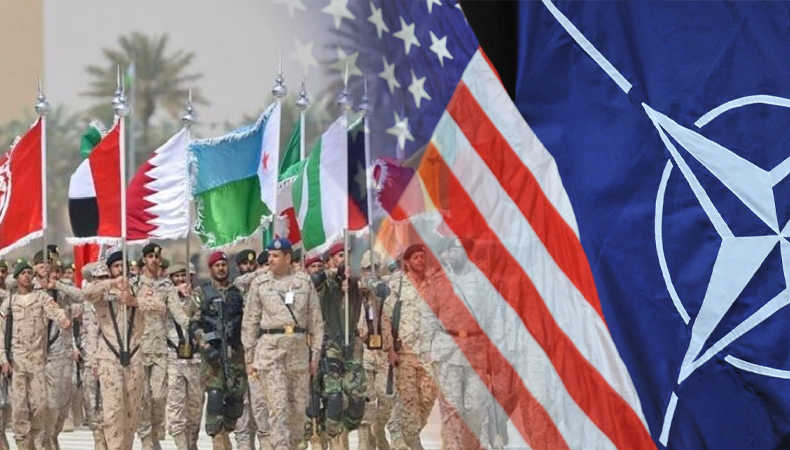Shifting Geopolitical Dynamics: Gulf Military Alliance Could Likely Isolate U.S and NATO

As Europe talks of NATO membership for Ukraine and U.S looks on, questions are arising about why the Middle East doesn’t have a similar military alliance. There was the Central Treaty Organization (CENTO), which had the NATO model and was backed by western powers, but failed to secure the cooperation of Arab states.
The U.S, under the Donald Trump administration, tried to establish the Middle East Strategic Alliance (MESA) to tackle Iran’s expansion but it failed to bear fruit. Washington sought to unite the Gulf Arab states with Jordan and Egypt against Iran and its proxies. The U.S regarded MESA as a holistic agreement to include economic, energy, political and security elements.
Read Also | Putin’s Response to Wagner Mutiny Highlights Russia’s Relationship with Syria and Iran
However, Washington failed to gain ground because of the Saudi-led economic and political boycott of Qatar. MESA was unsustainable because of lack of trust and divergent goals between Middle Eastern countries. The U.S has tried, tested and failed to engage with the Arab nations for military collaboration.
Islamic Alliance
But it should be noted that the Middle East does have an “Islamic Military Alliance” (IMA). The member states are part of the Organization of Islamic Cooperation (OIC). This coalition is Sunni-dominated and excludes Iran, Iraq and Syria. The Saudi-led IMA was formed as a counter-terrorism military alliance by the Muslim countries. It helped dispel and disrupt the ISIL and other terrorist groups in the region. Member countries include Jordan, UAE, Pakistan, Bahrain, Bangladesh, Benin, Turkey, Chad, Togo, Tunisia, Senegal, Djibouti, Sudan, Sierra Leone, Somalia, Gabon, Guinea, Palestine, Comoros, Qatar, Cote d’Ivoire, Kuwait, Lebanon, Libya, Maldives, Mali, Malaysia, Egypt, Mauritania, Niger, Morocco, Nigeria and Yemen. Oman, Afghanistan and Eritrea joined later on.
Read Also | Protesters in Iran Are Retreating. But How Long Will This Hold?
The IMA member countries have modest to considerable military strength. It has commitment for sharing intelligence, training and military support for counter-terrorism initiatives, among the Muslim majority countries.
Evolving Geopolitics
Changing power dynamics in the world has prompted countries to stray away from the U.S, and look after their own. The U.S’s power is waning, owing to China and Russia and Latin America. Last month, China helped normalize relations between Saudi Arabia and Iran. The improving relations jolted Washington as a number of countries in the Middle East, like Egypt and Jordan, who have traditionally been hostile to Iran, are looking for rapprochement to align their policies with the evolving geopolitical developments across the region.
UAE and Bahrain had advocated for the U.S. to implement maximum pressure on Iran, but now they are engaging Tehran on unprecedented levels. This has made Washington woozy as it still sees Iran as a major threat. The Middle East has embarked from a policy of tension and conflict to one of dialogue and cooperation.
And now to the US’s dismay, Iran has proposed a new maritime alliance with Gulf Arab and South Asian states. This follows UAE’s exit from a US-led maritime coalition in the Gulf. A U.S. military official brushed off Tehran’s proposal saying that Iran is the number one cause of regional instability. He believes Iran wants to form a naval security alliance to protect the very waters it threatens. The official highlighted that Iran has attacked or seized 15 internationally flagged merchant vessels in the past two years alone.
Irrespective of the U.S’s views, Iran, Saudi Arabia, United Arab Emirates, Bahrain and Qatar are forming an alliance that would also include India, Pakistan and Iraq.




